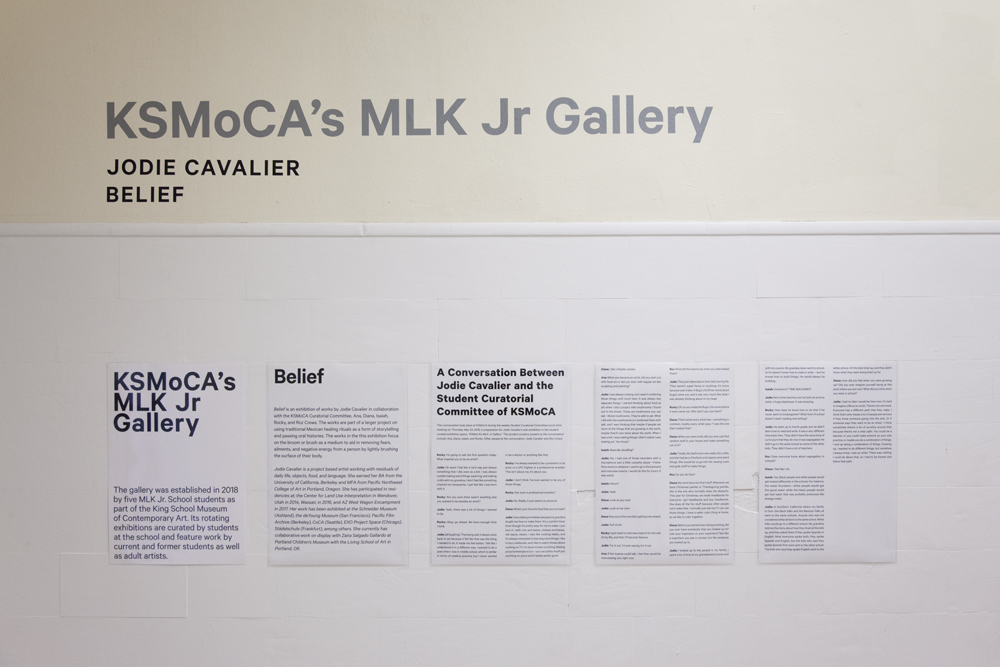
May 30 – November 20, 2019
This exhibition was curated by the Student Curatorial Committee.
Belief is an exhibition of works by Jodie Cavalier in collaboration with the KSMoCA Student Curatorial Committee, Ana, Diana, Isaiah, Rocky, and Roz Crews. The works are part of a larger project on using traditional Mexican healing rituals as a form of storytelling and passing oral histories. The works in the this exhibition focus on the broom or brush as a medium to aid in removing fears, aliments, and negative energy from a person by lightly brushing the surface of their body.
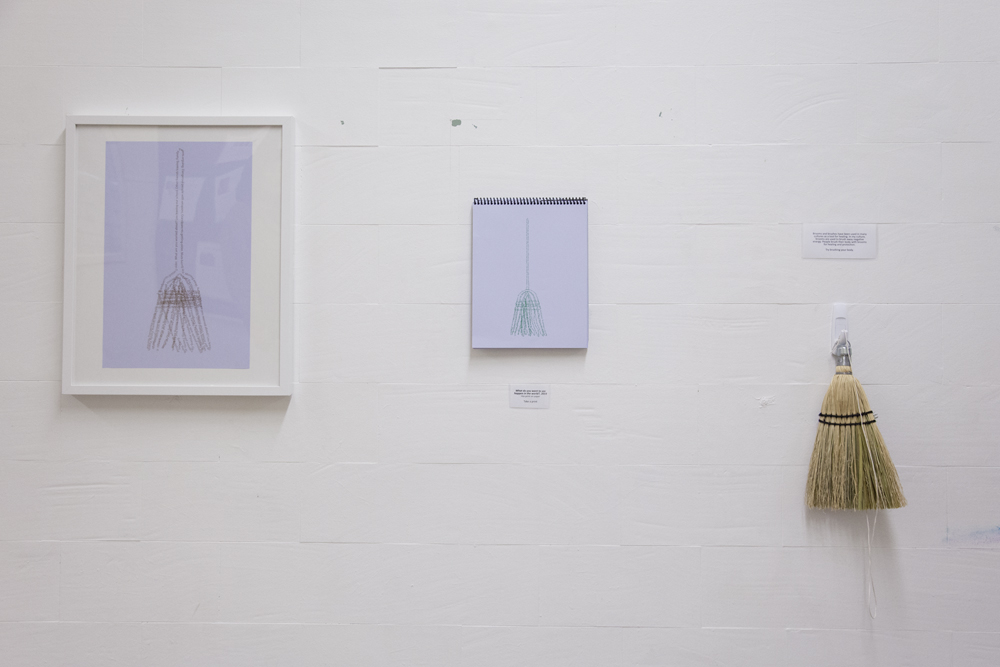
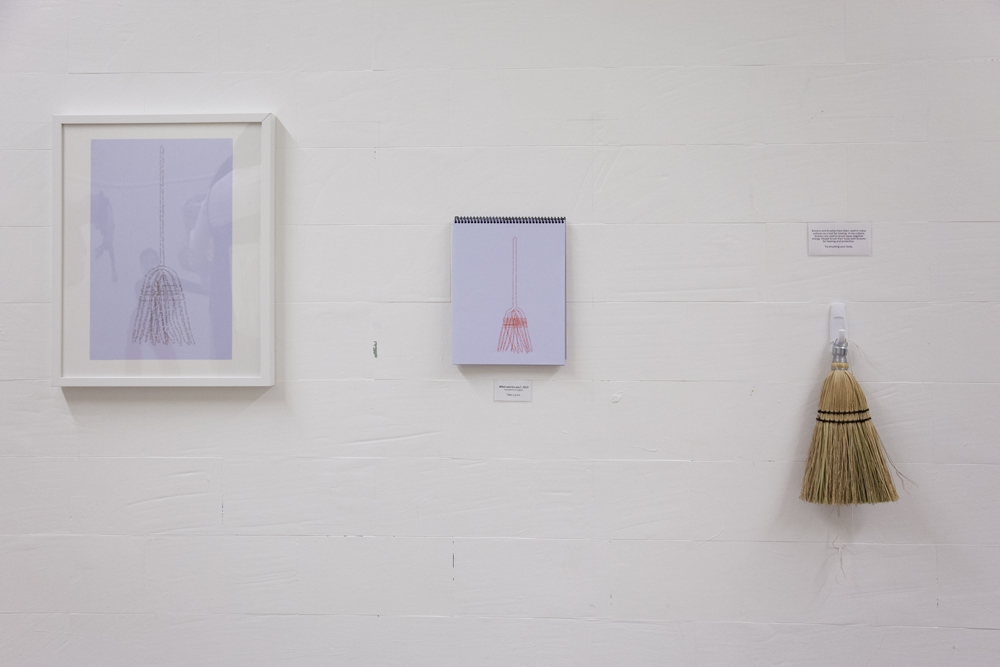
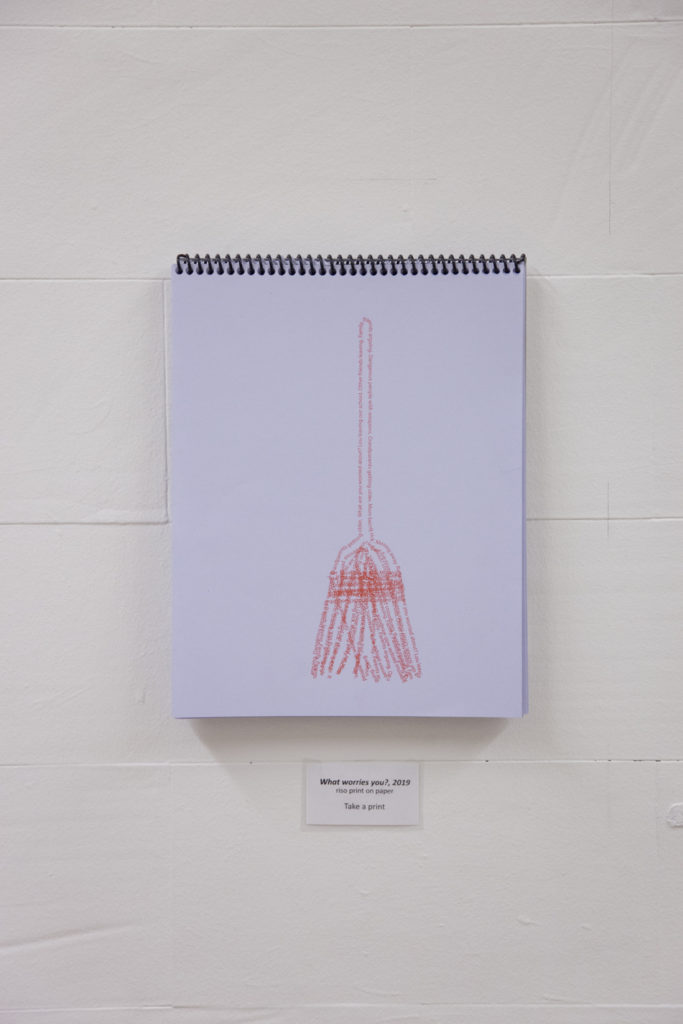
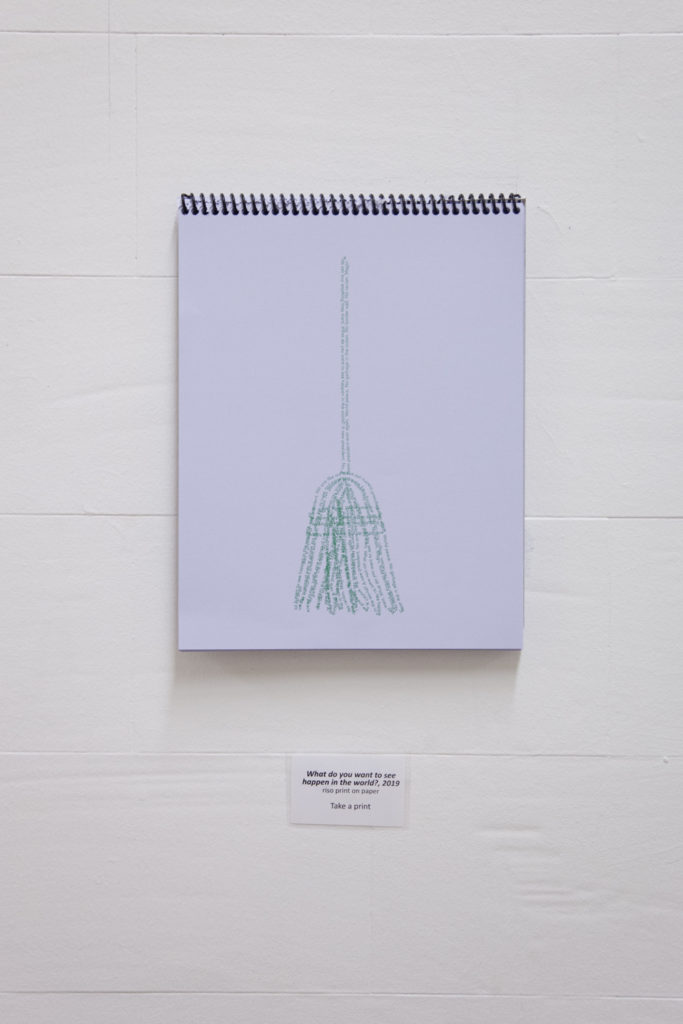
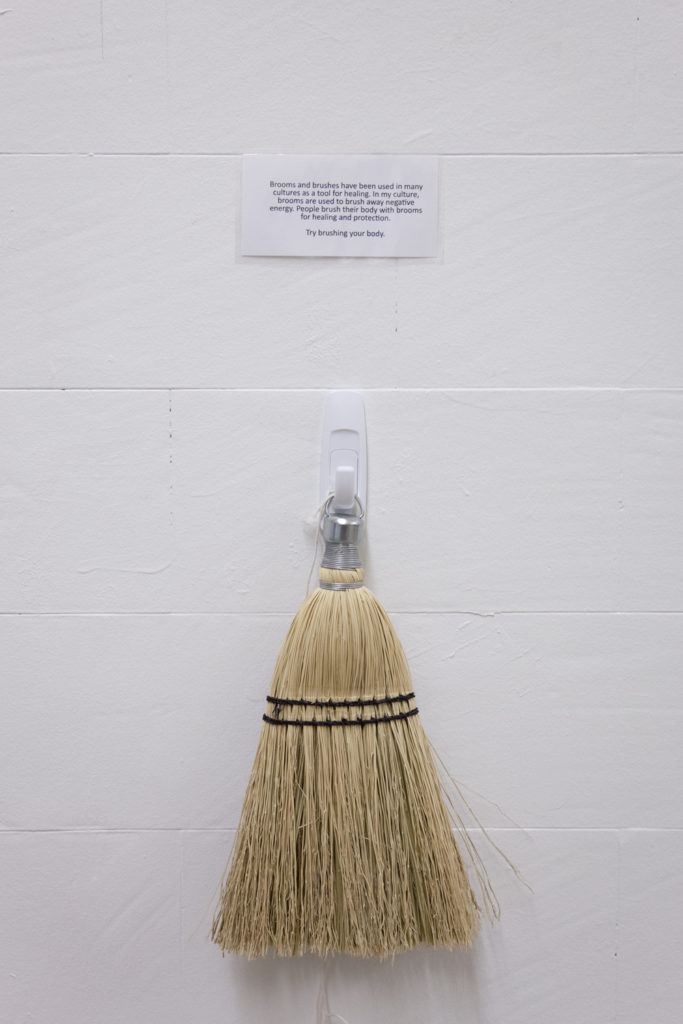
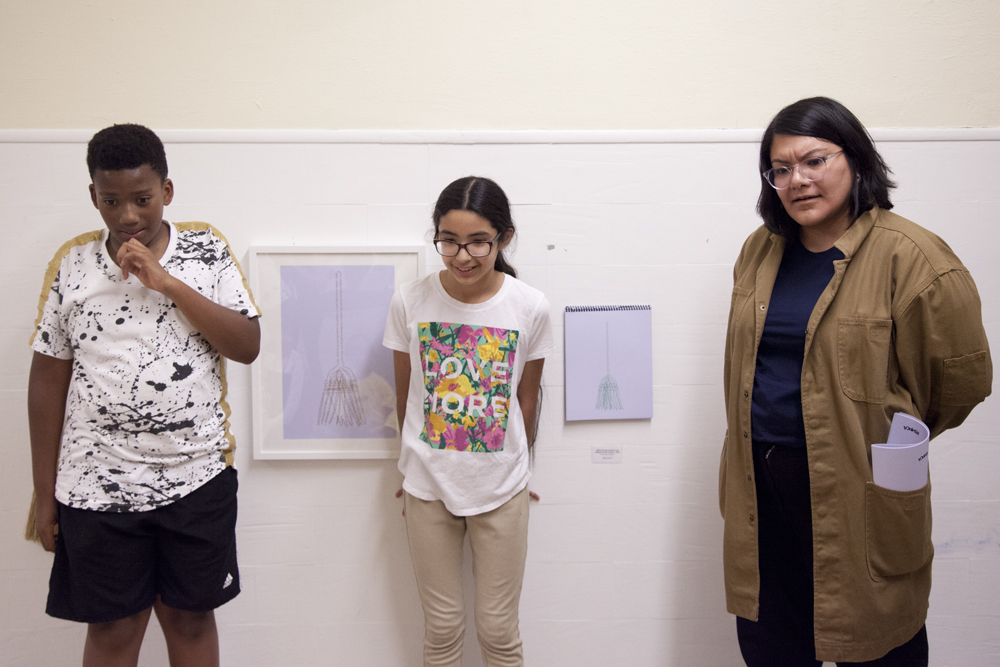
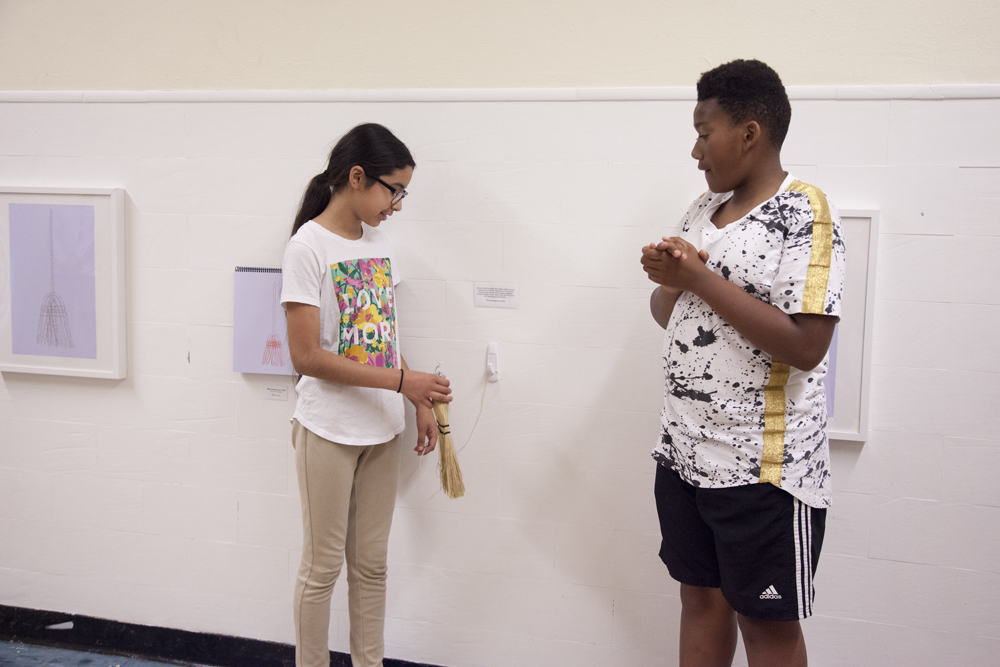
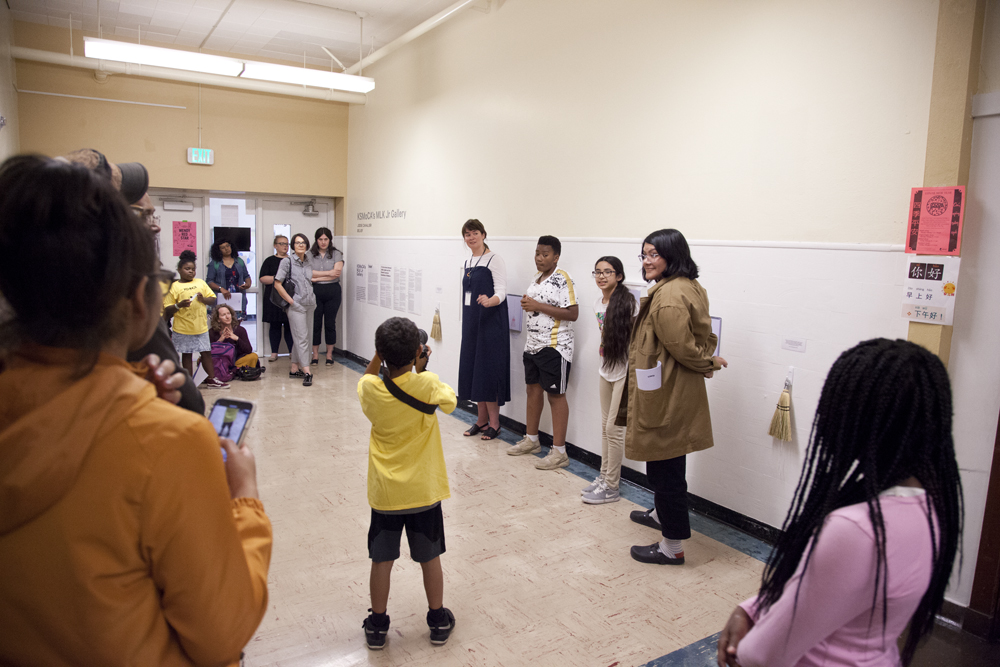
SCC Interview with Jodie Cavalier
This conversation took place at KSMoCA during the weekly Student Curatorial Committee lunch-time meeting on Thursday May 23, 2019, in preparation for Jodie Cavalier’s solo exhibition in the student curated exhibition space, “KSMoCA’s MLK Jr Gallery.” The student curators present at the conversation include: Ana, Diana, Isaiah, and Rocky. Other people at the conversation: Jodie Cavalier and Roz Crews.
Rocky: I’m going to ask the first question today. What inspired you to be an artist?
Jodie: Oh wow! I feel like it [art] was just always something that I did, even as a kid. I was always outside making weird things, exploring, and making crafts with my grandma. I don’t feel like something inspired me necessarily, I just feel like I was born with it.
Rocky: Are you sure there wasn’t anything else you wanted to be besides an artist?
Jodie: Yeah, there was a lot of things I wanted to be.
Rocky: Okay, go ahead. We have enough time I think.
Jodie: [all laughing]. That being said, it always came back to art because it felt like that was the thing I needed to do. It made me feel better. I felt like I understood it in a different way. I wanted to be a poet when I was in middle school, which is similar in terms of creative practice, but I never wanted to be a doctor or anything like that.
Rocky: I’ve always wanted to be a president or an actor or a UFC Fighter or a professional wrestler. This isn’t about me, it’s about you.
Jodie: I don’t think I’ve ever wanted to be any of those things.
Rocky: Not even a professional wrestler?
Jodie: No. Really. It just seems so physical.
Diana: What’s your favorite food that you’ve made?
Jodie: I love making enchiladas because my grandma taught me how to make them. It’s a comfort food. Even though it’s pretty easy for me to make, I just love it – with rice and beans, cheese enchiladas, red sauce, classic. I also like cooking Italian, and I’m always interested in learning more things. I like to buy cookbooks, and I like to watch shows about cooking on TV. I’m down to learn anything. Making pizza homemade is fun – you can pretty much put anything on pizza and it tastes pretty good.
Diana: I like chiladas verdes.
Ana: When you became an artist, did you start out with food art or did you start with regular art like sculpting and painting?
Jodie: I was always cooking, but I wasn’t combining those things until much later. It was always two separate things. I started thinking about food as art when I did a project with mushrooms I found out in the forest. These are mushrooms you can eat – Morel mushrooms. They’re safe to eat. What I did with the mushrooms is I combined them with salt, and I was thinking that maybe if people eat more of the things that are growing in the earth, maybe they’ll care more about the earth. When I was a kid, I was making things I didn’t realize I was making art. You know?
Isaiah: Basically doodling?
Jodie: No, I had one of those recorders with a microphone and a little cassette player – Fisher Price brand or whatever. I used to go in the backyard and interview insects. I would do this for hours. It was weird.
Isaiah: Hours?
Jodie: Yeah.
Diana: Look at you now!
Jodie: Look at me now!
Diana: Now you’re the one that’s getting interviewed.
Jodie: Full circle!
Rocky: I just need to interview insects for the rest of my life, and then I’ll become famous.
Jodie: Try it out. I’m just saying, try it out.
Ana: If the insects could talk, I bet they would be interviewing you right now.
Roz: What did the insects say when you interviewed them?
Jodie: They just talked about their daily boring life. They weren’t super heros or anything. It’s funny because year’s later, A Bug’s Life [Pixar movie about bugs] came out, and it was very much like what I was already thinking about in my head.
Rocky: Oh, so you made the Bug’s Life movie before it even came out. Why don’t you sue them?
Diana: That’s what every artist has – something in common, mostly ever artist says: “I was the one that created that.” When you were a kid, did you ever just find random stuff in your house and make something out of it?
Jodie: Totally. My dad’s mom was really into crafts, and she had jars of buttons and zippers and weird things. She would let us go into her sewing room and grab stuff to make things.
Roz: Do you do that?
Diana: My mom has a lot of art stuff. Whenever we have Christmas parties or Thanksgiving parties, she is the one who normally does the desserts. This year for Christmas, we made headbands for everyone – girl headbands and boy headbands. She does all the fun stuff because other people can’t make that. I normally just ask her if I can use those things. I have a water color thing at home, so we like to color together.
Before you started even doing anything, did you ever have somebody that you looked up to? Like your inspiration or your superhero? Not like a superhero you see in movies, but like someone you looked up to.
Jodie: I looked up to the people in my family. I spent a lot of time at my grandparents house and with my cousins. My grandpa never went to school, so he doesn’t know how to read or write – but he knows how to build things. He would always be building…
Isaiah: Inventions? TIME MACHINES?
Jodie: Not a time machine, but he built me and my sister a huge playhouse. It was amazing.
Rocky: How does he know how to do that if he never went to kindergarten? What kind of school doesn’t teach reading and writing?
Jodie: He went up to fourth grade, but he didn’t learn how to read and write. It was a very different time back then. They didn’t have the same kind of curriculum that they do now. It was segregated. He didn’t go to the same school as some of the other kids. They didn’t have a lot of teachers.
Roz: Does everyone know about segregation in schools?
Diana: I feel like I do.
Isaiah: Yes. Black people and white people would get treated differently in the schools. For instance, the water fountains – white people would get the good water while the black people would get bad water that was probably poisonous like sewage water.
Jodie: In Southern California where my family is from, the black folks and the Mexican folks all went to the same schools. Anyone who was not considered white all went to the same school. White folks would go to a different school. My grandma told me this story about how they lined all the kids up, and they asked them if they spoke Spanish or English. Most everyone spoke both, they spoke Spanish and English, but the kids who said they spoke Spanish first were sent to the other school. The kids who said they spoke English went to the white school. All the kids lined up, and they didn’t know what they were being lined up for.
Diana: How did you feel when you were growing up? Did you ever imagine yourself being at this point where you are now? What did you think when you were in school?
Jodie: I had no idea I would be here now. It’s hard to imagine a life as an artist. There’s not one track. Everyone has a different path that they make. I think that’s why maybe a lot of people are nervous if they know someone going into the arts. Or if someone says they want to be an artist – I think sometimes there’s a lot of scrutiny around that because there’s not a clear path. You could be a teacher, or you could make artwork as your sole practice, or maybe you do a combination of things. I end up doing a combination of things. Growing up, I wanted to do different things, but somehow I always knew I was an artist. There was nothing I could do about that, so I had to be honest and follow that path.